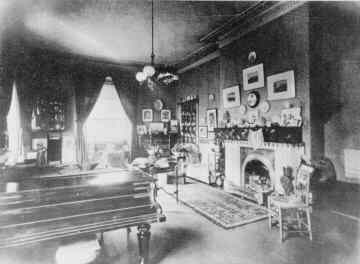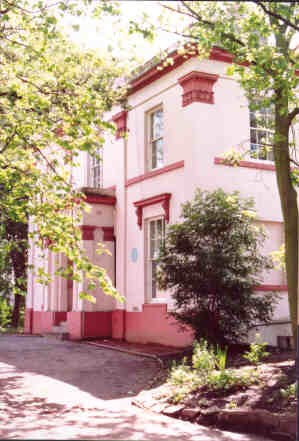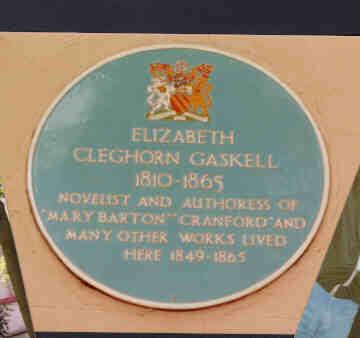




42 Plymouth Grove

Drawing-room of the Gaskell House, 42 Plymouth Grove, Manchester

In 1850 they decided to move from Upper Rumford Street into a larger house. Their financial circumstances had improved since William's appointment as tutor at Manchester New College, and Elizabeth's earnings as a writer were increasing. In addition she received a second legacy from Aunt Lumb's estate, following the death of her aunt Abigail Holland, when the girlhood home at Knutsford was sold. William and Elizabeth found just the house they wanted at 42 Plymouth Grove, not far from Rumford Street, but at that time, as its name suggested, a leafy district with open fields near at hand and a sizeable garden. Elizabeth at first had a few qualms of conscience about 'spending so much on so purely selfish a thing as a house is when so many are wanting', as she wrote to her friend Eliza Fox, but admitted to being 'highly delighted at the delight of everyone else in the house, Meta and William most especially are in full ecstasy'. She tried to justify herself by saying 'It is Wm. who is to decide on all these things and his feeling it right ought to be my rule and so it is - only that does not quite do. Well, I must try and make the house give as much pleasure to others as I can and made it as little a selfish thing as I can'. And so it proved.
The removal to their new home heralded the beginning of the crowded years for both of them and the incomings and outgoings at Plymouth Grove could be likened to the activities of a beehive. They had come a long way since the simple house at Dover Street where they had required only the services of the servant Betsy, until the babies were born. At Rumford Street Arm Hearn joined them and remained with the family for fifty years, always referred to as Hearn who became the 'dear good valuable friend' that Elizabeth described her and someone with whom she and William were happy to trust the care of the girls when little, and their chaperone on their travels as they grew older. More domestic staff were needed at 42 Plymouth Grove, where there were seven bedrooms, two attics, three living rooms and kitchen premises in the basement. They took on a cook and several maids, at one time employing a staff of five including a man for outside work, and also using the services of a washer- woman and sempstress. Although relieved of many domestic tasks Elizabeth never relinquished the running of the household and worked in close harmony with the staff, training them well and taking a keen interest in their welfare. It is perhaps sometimes forgotten that the Victorians who employed young domestic staff took on serious responsibilities, standing in loco parentis. William and Elizabeth were exemplary employers, taking a close interest in the personal problems of those who worked for them, readily granting leave of absence so that they could go home at times of family crises, and in 1851 their cook Mary was married by 'the Master'. Once Elizabeth was established as an authoress and was earning money from her books she travelled a great deal with her daughters to further their education and it was imperative to have trustworth servants to keep the household running smoothly for William while she was away and his chapel duties kept him in Manchester. Of necessity their scale of entertaining increased in frequency and in numbers of visitors, so domestic help was essential. Their style of life was gradually changing and perhaps they sometimes looked back with nostalgia to the informalities of their early married life, such as the occasion when they thought nothing of walking, Elizabeth in great thick shoes and William in boots and without gloves, to a christening party in north Manchester, walking back home in daylight at 3.30 a.m., as she described in a letter in midsummer 1838.
This extract is taken from Barbara Brill, William Gaskell 1805-84 (Manchester: Manchester Literary and Philosophical Publications Ltd, 1984), pp.81-83.
It is reprinted here with the author's courteous permission.


The International Society, now 84 Plymouth Grove

The future of Elizabeth Gaskell's Plymouth Grove house continues to concern us. Back in December 1994, the Vice-Chancellor of Manchester University wrote that it had in fact assumed ownership in 1973 but that it was concerned about 'the apparent cost of repairing' the house 'relative to the property's value'. (Very considerable sums have been estimated to put right structural and other defects.) Also, he stated that the University now wished to relocate the International Society in a better place.
The Gaskell Society Committee and a number of individual members have therefore kept this matter under constant review. A great deal of quiet work has gone on behind the scenes, both with the University and more generally. In particular, it has seemed valuable to investigate the history of the house, not only in Elizabeth Gaskell's time but thereafter. Her husband and daughters playe a part in the public life of Manchester after 1865 that adds considerably to its significance in the City's history.
The Plymouth Grove house was again carefully discussed at the Gaskell Society Committee's February meeting. Although the University will have no future use for the house, it has not yet identified funds for the transfer of the International Society to a more central location in its campus, nor has it yet found premises requiring little or no adaptation. We are also told that it is 'highly improbable that 84 Plymouth Grove will become vacant before the summer of 1998 at the earliest' and that any discussions concerning its eventual sale are at present 'premature'.
The Committee does not believe that the Society could assume such a major responsibility alone, but recommends that we associate ourselves with other groups possessing a strong interest in Manchester's heritage. City improvements of many kinds are in hand or under consideration. It is thought that at this stage the establishment with others of a charitable association, The Friends of 84 Plymouth Grove might be the most effective way of proceeding.
J A V Chapple & Joan Leach
(The Gaskell Society Newsletter, No.23, March 1997, p.14)

 Top of Page
Top of Page
 Matsuoka's Home Page
Matsuoka's Home Page
